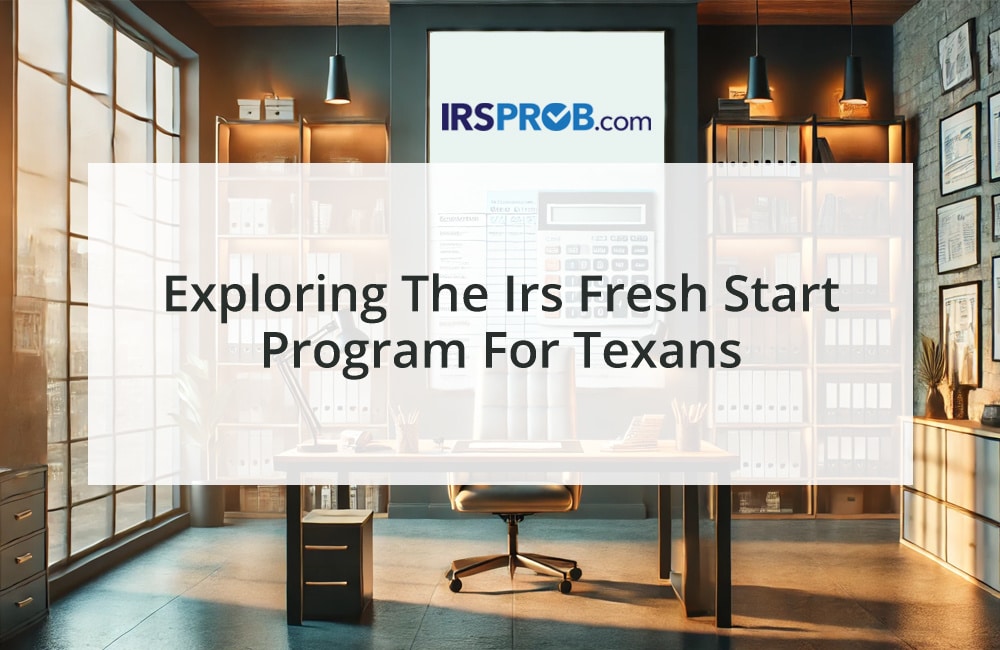Understanding the Landscape of Tax Consultation in Texas
Effective tax consultation in Texas requires a clear understanding of the unique state-specific challenges and opportunities that residents and business owners face. Texas, with its distinct tax regulations, independent legal frameworks, and a robust economy, presents an environment where nuanced strategies can yield significant financial benefits. This section explores the overall tax consultation landscape, highlighting the critical aspects such as federal versus state tax laws, regional compliance requirements, and the importance of tailored consultation approaches.
At IRS Prob, we believe that successful tax consultation is more than just number-crunching—it is about understanding the interplay between regional legislation and individual financial situations. Texans benefit from state-specific rules, and staying updated on these guidelines can help you avoid costly mistakes. By integrating local expertise with broad tax strategies, you can develop a consultation plan that maximizes deductions, streamlines returns, and ensures complete compliance with both federal and state authorities.
This piece emphasizes “effective tax consultation Texas techniques” that are designed to cater to your specific needs. With the constant evolution of tax laws, keeping abreast of local updates is imperative. In addition to standard bookkeeping, focusing on Texas guidelines, such as franchise tax implications and property taxation, can unveil opportunities for financial optimization.
Foundational Strategies for Effective Tax Consultation
Implementing effective tax consultation Texas techniques begins with a strong foundation built on knowledge, organization, and precision. Taxpayers must realize that each financial decision impacts their tax outcomes. By meticulously planning throughout the year instead of scrambling at tax time, Texans can reap benefits from deductions, credits, and strategic investments.
One primary strategy is meticulous record-keeping. Maintaining up-to-date documentation, such as receipts, invoices, and transaction records, is crucial for supporting your tax claims. Using digital tools and weekly financial reviews can enhance the accuracy of your records and significantly reduce errors when filing taxes. Moreover, a well-organized financial system makes it easier for your tax consultant to analyze your situation and advise you on potential tax-saving opportunities.
Another foundational aspect is staying informed. With regular updates to federal and Texas tax laws, continuous education—via webinars, local tax workshops, or professional literature—is necessary. Network with local tax experts to gain insights into recent changes, and become a proactive participant in your financial planning rather than a passive observer.
The role of tax planning extends to personal financial decisions and business operations. For instance, Texas business owners should explore entity structures that maximize tax advantages, while individuals might look into timing income or deferring certain deductions to optimize tax liability. Such strategic planning can boost overall financial efficiency and reduce stress during tax season.
Leveraging Advanced Tax Consultation Techniques
As tax issues become more nuanced, traditional methods may no longer suffice. Advanced tax consultation strategies incorporate data analysis, predictive modeling, and expert consultations that provide dynamic insights into your tax position. It’s time to move from the basics to sophisticated methods that maintain compliance while optimizing financial outcomes.
Effective tax consultation Texas techniques now include utilizing technology-driven tools that analyze spending patterns, forecast tax liabilities, and identify potential areas for savings. Tax software tailored for Texas business climates can integrate federal and state data, allowing a comprehensive review of your fiscal health. These tools not only highlight deductions and credits but also assist in tax planning throughout the fiscal year.
Another advanced strategy involves engaging multidisciplinary teams. Collaborate with financial advisors, legal experts, and tax consultants who have specialized knowledge in Texas tax law. These professionals can provide a holistic view that takes into account the interrelationship between various tax elements—including property taxes, income taxes, and business-specific taxes.
Advanced techniques also require a proactive approach. Rather than waiting near deadlines, set quarterly review meetings to assess your financial performance against tax liabilities. This iterative process provides ample time to make adjustments, ensuring that you are always one step ahead. Such involvement not only facilitates better planning but also creates an audit-ready system that minimizes legal risks.
Navigating Legal and Compliance Challenges in Texas
Understanding the legal framework is paramount for any taxpayer in Texas. The state has its own set of rules that operate alongside federal guidelines. For individuals and businesses alike, comprehending these intricacies can spell the difference between a smooth tax filing process and potential legal issues.
Effective tax consultation Texas techniques must be rooted in a solid grasp of both state-specific and federal tax laws. This involves recognizing exemptions, understanding the obligations imposed by the Texas Comptroller of Public Accounts, and knowing when to seek legal advice. Regular changes in legislation mean that even the most diligent taxpayer must stay updated to avoid non-compliance issues.
Recent updates in tax regulations have made it necessary for tax professionals to continuously review compliance status. Texans need to be aware of new rates, upcoming deadlines, and shifts in policy that may affect their filings. For instance, understanding the nuances of local franchise taxes and their impact on businesses is essential for accurate financial planning.
Part of meeting legal obligations is adequate documentation. The IRS and the Texas state authorities scrutinize records to ensure that deductions are justifiable and expenses are eligible. Tax consultants are encouraged to advise clients on maintaining audit trails and upholding the standards required by law. This level of diligence not only reduces the risk of penalties but also builds credibility with tax authorities.
Identifying and Overcoming Common Tax Consultation Pitfalls
Despite the best intentions, tax consultation can sometimes be fraught with pitfalls that lead to errors, missed opportunities, or even legal complications. Recognizing these common issues and addressing them head-on is crucial for successful tax planning in Texas.
One prevalent challenge is inadequate record management. Many taxpayers underestimate the complexity of documentation needed during an audit. Missing receipts or poorly organized financial documents can result in denied deductions and penalties. To overcome this, developing a systematic approach to record-keeping can be a game changer. Employing cloud-based solutions ensures flexibility and security for your tax records.
Another frequent pitfall is procrastination. Relying on last-minute efforts to compile tax information increases the likelihood of overlooking critical details. Texans must adopt a year-round perspective, setting aside regular sessions for financial review and consultation. This proactive mindset not only streamlines the filing process but also allows for corrections before deadlines approach.
A lack of professional guidance can also hinder effective tax consultation. Many individuals and small business owners in Texas attempt to handle intricate tax issues on their own. While basic filing may be achievable personally, advanced strategies, especially those involving significant financial transactions, require expertise. Partnering with professionals who have a deep understanding of effective tax consultation Texas techniques ensures that your strategy is both thorough and legally compliant.
Furthermore, a failure to update oneself with regulatory changes poses a serious risk. Tax laws are subject to periodic reforms, and falling behind can result in non-compliance. Actively seeking updated advice and attending local seminars can mitigate this risk significantly.
Optimizing Your Tax Consultation Plan: Best Practices and Local Insights
Optimizing your tax consultation plan is both an art and a science. Given the unique set of challenges in Texas, employing best practices and tapping into local insights can significantly elevate your tax strategy. Texans have the advantage of working in an environment where both state and federal tax benefits can be harmonized through targeted consultation practices.
One best practice is setting clear financial goals at the beginning of the fiscal year. Whether you are a corporation or an individual, understanding your financial objectives enables a better alignment of your tax strategy. This goal-oriented approach ensures that every financial decision, from major purchases to minor expenses, is evaluated through the lens of tax consequences. Working closely with a tax consultant can help refine these objectives into actionable steps.
Local insights are invaluable when it comes to leveraging effective tax consultation Texas techniques. Networking with local business groups, attending community tax workshops, and consulting with professionals familiar with Texas-specific regulations enable you to glean nuanced perspectives. For example, many local experts are well-versed in the operational dynamics of the Texas economy and can offer detailed advice on managing state-specific obligations like franchise taxes and local property assessments.
Moreover, using technology to streamline your tax consultation is a best practice worth adopting. Digital dashboards and AI-driven analytics tools can provide real-time tracking of your financial status, ensuring that any tax-related discrepancies are identified and addressed promptly. Such tools help foster transparency and accuracy, reducing the anxiety that often accompanies tax season.
Lastly, establishing a structured review process is essential. Schedule regular consultations with your financial advisor to assess the progress of your tax strategy. Periodic reviews allow for recalibrations based on new regulatory developments or shifts in your financial situation. Maintaining this discipline transforms tax planning from a reactive emergency into a strategic, ongoing practice.
Success Stories: Texans Who Mastered Tax Consultation
There is no better testimony to the effectiveness of strategic tax consultation than the success stories of individuals and businesses who have navigated the complexities of Texas tax law with precision. These success stories not only inspire but also provide practical insights that others can adopt in their own tax strategies.
Consider the case of a mid-sized Texas manufacturing company that leveraged advanced tax consultation techniques to streamline its operations and achieve significant tax savings. By working closely with local tax experts and employing data-driven strategies, the company managed to identify overlooked deductions and optimize its filing process. This proactive approach not only saved them thousands of dollars but also positioned them as a compliant and strategic business in the eyes of Texas tax authorities.
Similarly, many individual Texans have benefitted from partnering with skilled tax consultants. One prominent example involves a freelance professional who initially struggled with the intricacies of self-employment taxes. After engaging with a tax consultant knowledgeable in effective tax consultation Texas techniques, this professional restructured their financial records, implemented digital record-keeping, and scheduled quarterly financial reviews. As a result, not only did the individual manage to reduce their tax burden, but they also gained peace of mind knowing that future tax obligations would be efficiently managed.
These stories underline that success in tax consultation is achievable through diligence, proper planning, and local expertise. They serve as blueprints for anyone looking to maximize benefits while ensuring complete compliance. Texans who have taken the time to understand the local tax environment and implement customized strategies are reaping long-term rewards.
Frequently Asked Questions about Effective Tax Consultation Texas Techniques
Pro Tips from IRS Prob
Pro Tip #1: Leverage Local Expertise
Teaming up with tax professionals who understand the intricacies of Texas tax law can significantly enhance your consultation strategy. They can provide tailored advice on deductions, compliance, and audits, ensuring that you capture every tax-saving opportunity available in the local market.
Pro Tip #2: Embrace Digital Tools
Utilize modern tax software and digital record-keeping systems to maintain an organized financial portfolio. These tools not only simplify the documentation process but also offer real-time insights and alerts on potential discrepancies, ensuring you remain proactive and compliant with evolving tax laws.
Pro Tip #3: Schedule Regular Financial Reviews
Establish a routine for quarterly financial reviews with your tax consultant. This ongoing dialogue allows you to adjust your tax strategy based on the latest economic trends and legislative updates, thereby ensuring a comprehensive approach to managing both state and federal obligations.
In conclusion, mastering effective tax consultation Texas techniques is an evolving process that requires commitment to continuous education, diligent financial record management, and a proactive approach to evolving tax regulations. IRS Prob is proud to serve Texans with tailored strategies that bridge the gap between federal mandates and local requirements, ensuring that you achieve financial success and robust compliance. By integrating these expert practices into your tax consultation plan, you are better positioned to navigate the complexities of tax law and secure a prosperous future.
This comprehensive guide should serve as a resourceful companion on your journey to tax efficiency. With carefully structured strategies, timely updates, expert insights, and real-world success stories, you are well-equipped to transform your tax consultation approach. Remember, effective tax consultation Texas techniques are not just about saving money—they are about establishing a resilient financial foundation for you and your business in the thriving Texas economy.









